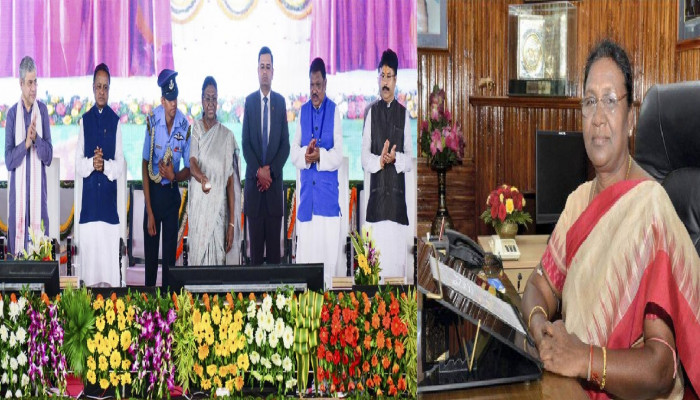President Murmu lays foundation for three new railway lines in Odisha
- In Reports
- 05:46 PM, Dec 07, 2024
- Myind Staff
President Droupadi Murmu laid the foundation stones for three significant railway lines; Bangiriposi-Gorumahisani, Buramara-Chakulia and Badampahar-Kendujhargarh—during a ceremony in Rairangpur, Odisha. The event marked the culmination of her five-day visit to the state.
Addressing the gathering, the President emphasised the transformative potential of these rail projects for the tribal-dominated Keonjhar and Mayurbhanj districts. “These railway lines will not only interconnect tribal areas with the mainstream economy but also support economic and industrial growth by providing essential infrastructure,” she said.
The Indian Railways highlighted that the new rail lines would ease the transportation of raw materials from Odisha’s mineral-rich regions, create jobs and promote socio-economic progress. President Murmu expressed her confidence that the projects would enhance commerce and connectivity in the region.
Apart from the railway initiatives, she also virtually inaugurated the Tribal Research and Development Centre, the Dandbose Airport, and a new sub-divisional hospital in Rairangpur. The President noted that these facilities would address the educational, healthcare and transportation needs of the local population.
“The Tribal Research Centre will preserve the rich cultural heritage of tribal communities, while the airport will boost regional connectivity,” she remarked, adding that the hospital’s 100-bed facility would significantly improve local healthcare services.
She also highlighted the government’s focus on inclusive development, noting the establishment of over 100 new Eklavya Model Residential Schools in Odisha, including 23 in the Mayurbhanj district. “After receiving education from these schools, tribal children will be able to contribute meaningfully to society and the nation,” she said.
During her visit, President Murmu inaugurated the new Judicial Court Complex in Bhubaneswar. She emphasised the need for timely justice, stating, “If justice is not delivered on time, it is equivalent to not getting justice. The poor suffer the most due to adjournments.”
She appreciated efforts to make judgments accessible in regional languages like Odia and Santhali. “Language is often a barrier for common people, but translated judgments available on the websites of the Supreme Court and Orissa High Court are a step in the right direction,” she said.
Acknowledging the growing participation of women in the judiciary, she noted that 48% of officers in the Odisha Judicial Service are women. She expressed hope for further increases in female representation in the coming years.
Earlier that day, the President addressed the convocation ceremony at the Odisha University of Agriculture and Technology in Bhubaneswar. Speaking to the graduating students, she said, “Convocation Day opens the path to a promising future. You are now entering a different ecosystem where your knowledge and skills will be rigorously tested in real-world situations.”
She applauded India’s transition from a food-importing nation to an agricultural exporter, crediting agricultural scientists and farmers for this transformation. However, she acknowledged challenges such as climate change, shrinking farm sizes and excessive fertiliser use, urging young scientists to find innovative solutions.
“Agriculture is facing new challenges like rising temperatures and greenhouse gases, which impact production. Excessive use of chemical fertilisers is another concern affecting soil, water, and the environment. I am confident that young scientists will address these issues,” she said.
On December 4, President Murmu attended the Navy Day celebrations at Puri Beach, where she witnessed the Indian Navy’s Operational Demonstration. She extended her greetings to Navy personnel, saying, “Today, on December 4, we celebrate our glorious victory in the 1971 war and commemorate the selfless service and supreme sacrifice made by naval personnel in the defence of the motherland.”
She highlighted India’s maritime heritage and the strategic importance of the Navy in ensuring maritime security. “India’s geography has endowed us with all the elements necessary to be a great maritime nation. With a glorious history to look back upon and a future full of promise, the Indian Navy continues to ensure maritime security, essential for our rise to a Viksit Bharat by 2047,” she stated.
President Murmu also commended the Navy’s efforts in empowering women, noting that the service was the first to induct women Agniveers. She praised Lieutenant Commanders Dilna K and Roopa for circumnavigating the globe as part of the Navika Sagar Parikrama II.
The President began her Odisha visit by attending the 75th-anniversary celebrations of Gopabandhu Ayurveda Mahavidyalaya in Puri. She highlighted the importance of Ayurveda in both prevention and cure, urging students to explore untouched aspects of the ancient medical system.
“India has rich traditions in physics, chemistry, astronomy, astrology, medicine, mathematics, and architecture. Contributions by great minds like Aryabhata, Brahmagupta, Charak, and Sushruta are noteworthy,” she said.
President Murmu also stressed preserving tribal knowledge about medicinal herbs, saying, “This traditional knowledge is slowly disappearing. Students must explore its scientific basis to prevent it from extinction.”
Throughout her five-day visit to Odisha, President Murmu underscored her commitment to the state’s development and her pride in its heritage. “Responsibilities and busy schedules have never distanced me from my birthplace. The pure affection of the people keeps drawing me back,” she said during her address in Rairangpur. Her engagements across various sectors—education, healthcare, infrastructure and heritage—reflect a holistic approach to progress, ensuring inclusive development for all sections of society.







Comments